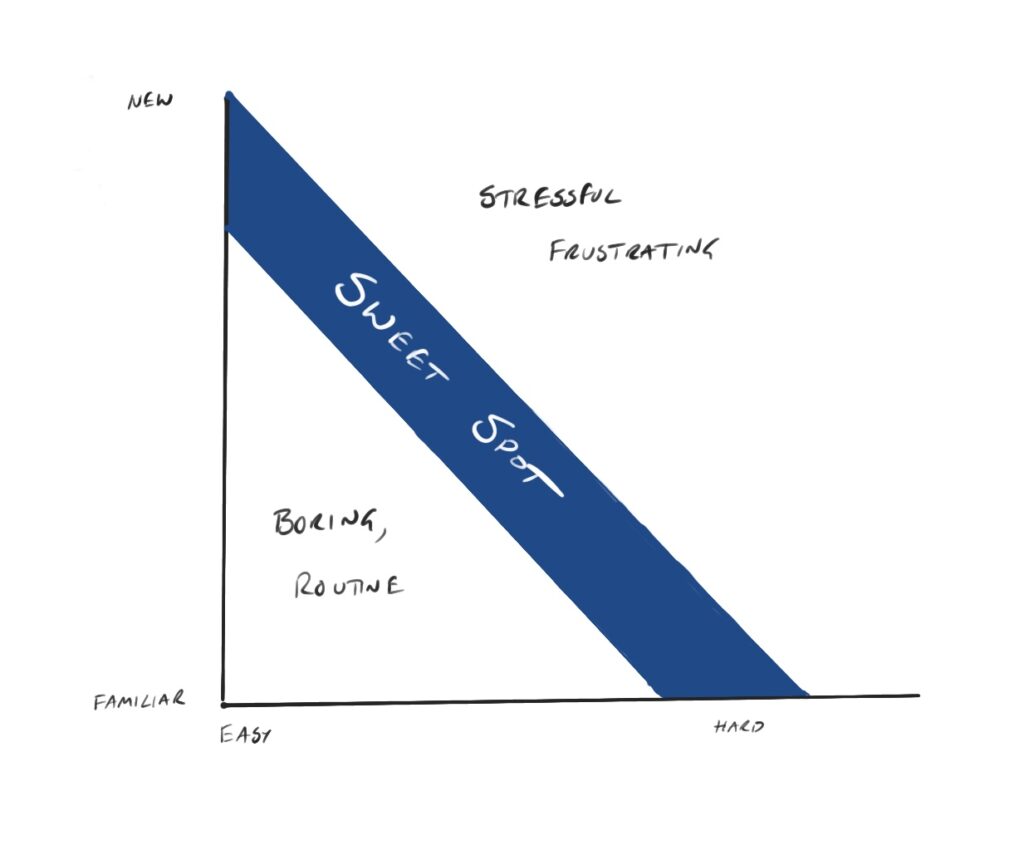In life a certain amount of challenge is necessary, but not all challenges are good. Choosing to challenge yourself regularly can help to develop resilience in difficult situations.
Although an easy life might sound enticing, pretty soon most people would start to get bored and frustrated. According to some stats from the Daily Telegraph, a sixth of people who retire before the age of 66 go back to work, frequently citing the reason ‘to get a new sense of purpose’. Personally, the thought of more than a couple of days ‘relaxing’ on a beach holiday makes me feel agitated…
Think about the time when you have had most satisfaction from a project or a piece of work. How many times has it been routine admin, and how many times has it been something that took a little bit of extra effort?
What are the benefits of challenges?
Four key benefits of challenges, or going out of your comfort zone are:
- Building resilience. I think you can see resilience as a muscle. Just as a plant that has been over-protected from the weather is less able to cope with harsher conditions, people who avoid (or are protected from) any sort of challenge find it harder to cope when things go wrong.
- Making life exciting. If all you had to do was lie on a beach all day, how long would it before you got bored? Or just imagine if every day just sailed along in exactly the same way all the time.
- Keeping your brain active. Remember all the fuss about the Nintendo brain training games and the claim that they could help stave off dementia? I haven’t gone back to fact-check the research, but I think it’s common sense to say that people who never use their minds become somewhat dull.
- Can help you develop in your career. If you want to get on in the workplace, taking on new challenges is essential. Whether it’s learning some new software or stepping up to take the lead on a project – getting noticed and honing your skills are vital for climbing the career ladder.
So, all challenges are good, huh?
Obviously not all challenges are equal – although a lot of self-help twaddle out there may leave you with the impression that anything can be overcome by anyone (if they have the right mindset and sign up for the exclusive online course!)
Some challenges are more difficult to cope with. As we’ve seen in the pandemic, some people have been faced with loss of livelihood, grief, isolation or on-going health problems. Not all people find the same things challenging – for me running 5K would be quite a big challenge but for a dedicated marathon runner it would be a warm-up. I used to work for a man who had set up a very successful company, sold it, then bought a small company and proceeded to build it up to be another very successful enterprise – there are not many people who would consider that to be a ‘little retirement project’.
The challenge sweet spot
Essentially, there is a ‘Challenge Sweet Spot’ which will be different for everybody in terms of difficulty and activity.

Move too far out of the blue band and it’s either boring or overwhelming/frustrating.
Going back to my earlier point about building the resilience muscle. I believe that the more you push yourself out of your comfort zone, the less thrown you will be by setbacks. Instead of going into panic-mode at the new situation, you will have patterns of action to draw on and the discomfort will feel more familiar.
How to avoid overwhelm
As well as regular practice of going out of your comfort zone, there are other ways to help keep you resilient in the face of challenges.
And I’m sorry, but they are not anything that your mother wouldn’t have you do:
- Get enough sleep. If you don’t already believe that sleep is the single most important thing you can do, read Matt Walker’s excellent book or watch the TED talk: Matt Walker: Sleep is your superpower | TED Talk
- Eat healthily and don’t drink too much. Although a few gin-and-tonics or a couple of beers might feel right at the end of a particularly bad day, we all know they don’t really help.
- Exercise. As well as helping to keep you healthy, exercise is also a great stress-buster.
- Take time out. It’s easy to get caught up in the stress of the moment and ruminate on a problem – which just magnifies your feelings and makes it worse.
Choose your challenges and develop resilience
So, in summary:
- Some challenge is necessary to make life interesting, develop your career and keep you healthy.
- Challenging yourself with new experiences, projects and learning will help to make you better able to cope with external changes and challenges that you have no control over.
- Taking good care of yourself is not just better for your physical health, but helps develop resilience needed for difficult situations.

